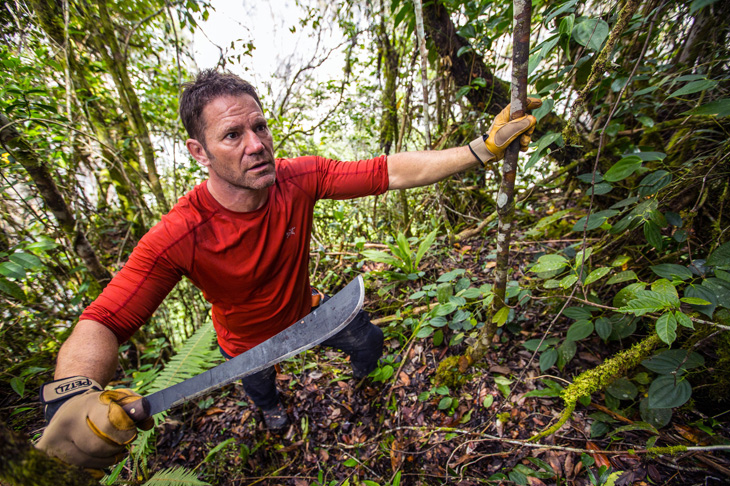Down the Mighty River with Steve Backshall (BBC2) was perfect Sunday-night TV — one of the most enjoyable adventure travelogues I’ve watched in ages. So I was quite surprised to see it reviewed lukewarmly by another critic. One of the critic’s objections was that the scene where Backshall spots a bird of paradise through his binoculars by the Baliem river in Papua New Guinea was a bit crap. Why couldn’t we have seen it in loving close-up detail, as you would on a David Attenborough?
But this is precisely what I loved about the documentary. It had a roughness, an unpredictability, a spontaneity that you rarely find on TV any more. I’m sick to death of watching meet-ups where the roving presenter has a ‘surprise’ encounter — pre-arranged months before by his producers — with some eccentric yet typical local characters and proceeds to immerse himself comically in some humiliating regional custom: having his testicles shaved by the Lapland women’s reindeer-wrestling team, drinking the fermented digestive juices of an orangutan through a Dyak’s penis gourd, and so on.
I agree that some presenters — such as Michael Mosley, who ate a sheep’s brain and braved a chilli-eating contest on the pleasantly watchable The Secrets of Your Food (BBC2) last week, and Backshall himself, who once tearily braved the ultimate pain by donning mittens filled with bullet ants — do it well. But you can have too much of a good thing and TV documentaries have long since passed that point: yes, I’m sure you’re ‘going on a journey’ (as you’re going to remind us at the beginning of each section); yes, wow, those aerial shots that you can all afford to do now you don’t need to hire a helicopter because of drones are just stunning; yes, gosh, no doubt it really is a race against time giving us the requisite sense of ‘jeopardy’ that has us all on the edge of our seats. You can save it for all the other viewers, though, because I’m not watching any more, unless I’m really bored and there’s nothing else on.
Which is how I stumbled on the Backshall. ‘Oh God, here we go,’ I sighed, thumb hovering over the remote, as Backshall and some intrepid Aussie adventurers prepared to kayak the length of the Baliem, everyone looking fit and wholesome, everyone digging the amazing scenery and plant life, everyone super-excited at finding just the most gorgeous camp spot in the middle of the river.
Then it all started going pleasingly wrong. First, two of the younger kayakers got fever, prompting the expedition leader to cancel that particular leg, partly on account of the fact that if things went tits up, an old man of 43 like Backshall just wouldn’t have the skill and strength to pull his weight. Backshall peeled off to a private place to deliver a little hissy-fit piece-to-camera.
As it turned out, though, Mister Aussie Health’n’Safety had probably made a sensible judgment call — for, further downstream, Backshall came about as close to dying as I have seen a name presenter do on TV (apart from maybe his precursor Steve Irwin). The rapids grew fiercer and Backshall found himself rolled and dragged under by the force of the water, the kayak-mounted camera capturing what could easily have been his last moments. Having just survived one such narrow scrape, he came to grief on the next, ejected from his kayak and swept helplessly downstream to what would have been near-certain death had he not caught the safety line tossed him by the expedition leader.
Cynical though I am about the manufactured nature of TV, I cannot believe the producers planned this.
Nor the scene where an abseil into some unexplored caves had to be suddenly cancelled after the natives got restless and threatened violence if it went ahead. Nor yet the scene where, exhausted after the rapids incident, they sought shelter in the nearest available settlement before nightfall. Backshall got another chance to show off his surprising and impressive language skills (he’s been exploring New Guinea for more than 20 years) and was granted the signal honour of getting to sleep with the villagers’ mummy.
This last was the desiccated 200-year-old corpse of the tribal brave who’d first established the Dani’s regional dominance. He’d been killed heroically in battle and then smoke-dried for six months over a fire so that he could stay in the chief’s hut, forever working his magical influence on all those who slept next to him. Backshall, who is always touchingly respectful on such issues, delivered a late-night piece to camera — mozzies whining audibly — expressing his profound gratitude for the privilege. You didn’t get the impression he was going to get much sleep.
Was any of this prearranged? Well, I do hope the documentary wasn’t lying to us when it implied that it was all spontaneous. In this new internet world, where everyone is a cameraman and outfits such as Vice can get journalists embedded in Raqqa, the BBC needs to realise that glossy production values just aren’t enough. You need that whiff of danger that nutcases like Backshall provide. The BBC is lucky to have him.







Comments